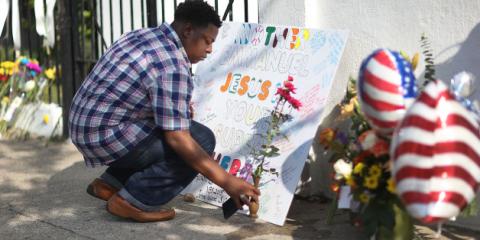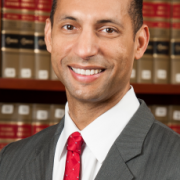
JOE RAEDLE VIA GETTY IMAGES
This blog post originally appeared in the Huffington Post. -MomsRising team
Black lives matter. They matter whether they are taken at the hands of a hate-filled 21-year-old in a church prayer meeting, by a police officer who shoots a suspect he fears is armed or in a drive-by shooting on Chicago's south side.
Thirty two people are murdered by guns every day in the United States. African-Americans represent 57 percent of the victims, despite the fact they account for only 13 percent of the overall U.S. population. Homicide is the leading cause of death for Black males aged 15-34. These lives matter.
The Black Lives Matter movement has galvanized public outrage over the recent police shootings of unarmed Black men and boys in Ferguson, North Charleston, and Cleveland -- to name just a few. Regarding these shootings as state-sanctioned violence, the Black Lives Matter movement rightly calls for changes in the use of force by police against citizens of color.
The nation should also be outraged by the Black lives lost every day to gun violence in cities large and small, and the role that our weak gun laws play in facilitating those deaths. Indeed, the policy choices our elected officials make to keep those laws weak are best understood as another form of state-sanctioned violence.
Other developed nations struggle with community disinvestment, mental illness, biased police officers, and negative media portrayals of black and brown men as criminals. But because they have stronger gun laws, they do not have the same level of killings of people of color, mass shootings, or police shootings of civilians. Indeed, in the U.K. police officers do not routinely carry guns.
There is compelling evidence that policies to make it harder to acquire guns save lives. Research shows that states that require all gun buyers to pass background checks, issue licenses to gun owners, and regulate gun sellers have lower rates of gun crime and violence. A recent study by Johns Hopkins University found that Connecticut's handgun permit law reduced firearm homicides by an astounding 40 percent. When Missouri repealed a similar law, gun homicides increased by 25 percent.
When states fail to pass laws that effectively restrict access to illegal guns, and instead enact laws to make it easier to buy and carry guns, they fail to sufficiently value Black lives and the lives of other Americans adversely affected by gun crime and violence. South Carolina's firearm homicide rate ranks 11th in the nation. It is no coincidence that it also has among the weakest gun laws.
Some commentators have declared that strengthening our gun laws to limit the proliferation of illegal guns seems impossible. But many states have stepped up, passing laws grounded in the research to expand background checks and reduce access to guns by people with a history of violence. We need not, and should not, wait for Congress to act. As Connecticut has shown, states have the power to dramatically reduce gun deaths.
We have become numbingly familiar with the routine that follows tragedies like the one at Emanuel AME Church. We come together as a nation to grieve and support the victims' families and community. If past is prologue, within a few days most of us who were not directly impacted by the tragedy will move on. But doing so would be another tragedy.
As President Obama noted, we cannot "pretend it is simply sufficient to grieve." We must combat racism, improve mental health treatment, and invest in minority communities. But unless and until we're prepared to take on the guns, these needless tragedies will persist.




The views and opinions expressed in this post are those of the author(s) and do not necessarily reflect those of MomsRising.org.
MomsRising.org strongly encourages our readers to post comments in response to blog posts. We value diversity of opinions and perspectives. Our goals for this space are to be educational, thought-provoking, and respectful. So we actively moderate comments and we reserve the right to edit or remove comments that undermine these goals. Thanks!